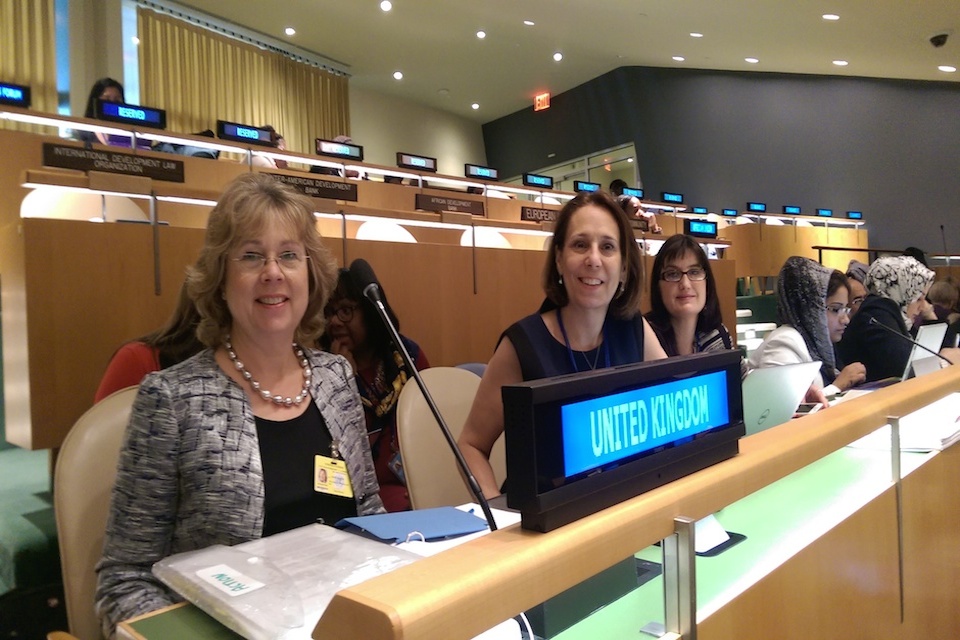UK statement at the Commission on the Status of Women
Baroness Northover, Parliamentary Under Secretary of State for DfID delivers UK statement on gender equality at the UN

Statement by the UK Government 59th Session on the UN Commission on the Status of Women
Twenty years ago some 30,000 activists descended on Beijing for a historic Women’s Conference where representatives from 189 governments agreed powerful commitments for advancing girls’ and women’s rights. These commitments formed the Beijing Declaration and Platform for Action.
The UK welcomes the opportunity to engage with UN Women and international partners to discuss progress for girls and women since Beijing, and more importantly to address persisting barriers to gender equality.
The UK Government believes that all girls and women have the right to live free from discrimination and violence and to fulfil their potential.
Women’s greater economic independence and participation is crucial to gender equality and global development. The UK has prioritised this at home and overseas.
In the UK there are more women in work than ever before – including in senior decision-making roles and as heads of businesses. We are closing the gender pay gap and working to ensure more girls pursue careers in science, technology, engineering and mathematics.
We’re introducing new legislation to help women into work – including flexible working, shared parental leave and tax-free childcare.
Overseas we have provided access to financial services to at least 26.4 million women and supported over five million girls to attend primary and lower secondary school.
VAWG
Violence against girls and women in all its forms is an abhorrent crime and must be eradicated. In the UK, we have introduced domestic violence protection orders and measures allowing women to check their partner’s criminal history. We criminalised forced marriage and female genital mutilation and we are clamping down on online sexism and abuse.
Internationally, we have committed £35 million to tackle Female Genital Mutilation in 17 countries and £36 million to tackle Child, Early and Forced Marriage in 12 countries.
In 2014 we hosted two global events to accelerate action on Child, Early and Forced Marriage, Female Genital Mutilation and Preventing Sexual Violence in Conflict. We want to end Child, Early and Forced Marriage and Female Genital Mutilation everywhere within a generation. We are campaigning to ensure that addressing the causes of, and impunity for, sexual violence in conflict are a central element of all discussions on the peace and security agenda.
We are also witnessing an increase in women’s leadership around the world. Maryam Mirzakhani became the first woman to win the Fields Medal, Malala Yousafzai was a joint recipient of the Nobel Peace Prize. And in the UK Fahma Mohamed, a school girl from Bristol, led a national campaign to raise awareness of female genital mutilation.
Their commitment to gender equality is inspiring.
This year there is a unique and great opportunity to enhance gender equality and girls’ and women’s empowerment.
We must ensure that the post-2015 development framework demonstrates a strong and explicit commitment to achieve gender equality, the empowerment and the realisation of the human rights of girls and women. This requires a standalone gender goal and the integration of transformative targets and indicators throughout all the goals. We need to agree how these goals and targets will be implemented. And we must secure more effective finances for gender equality and investment in improving gender data and statistics. 
We welcome the 15th anniversary of United Nations Security Council resolution thirteen twenty five and recognise the role of women in the prevention and resolution of conflicts, peace negotiations, peace-building, peacekeeping, humanitarian response and in post-conflict reconstruction.
The UK thanks UN Women and the Bureau for the opportunity to recommit to the Platform for Action. Gender equality is everyone’s business and we all have a role to play. We look forward to continuing to work together to fulfil the promises made in 1995 to girls and women everywhere.